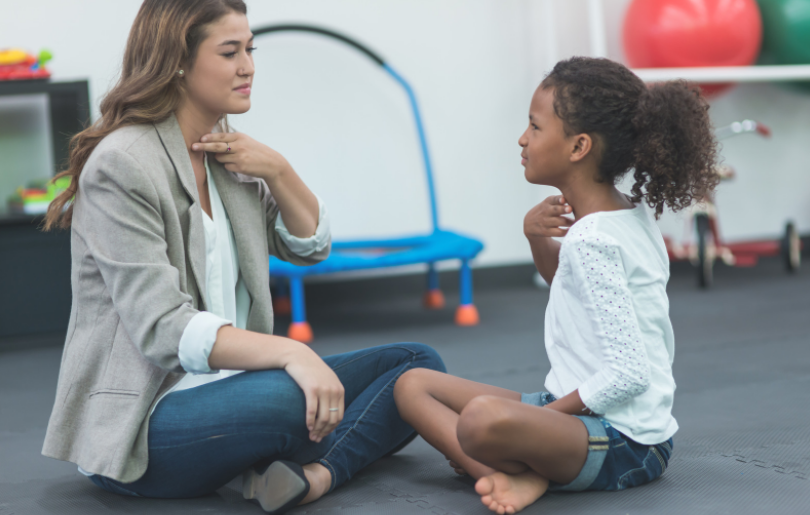
The Benefits of SLP and Psychologist Collaboration in the School Setting
I absolutely enjoy with working with my School Psychologist (SP). I say “my” in the most endearing way because I have taken ownership of the collaborative partnership we share. The symbiosis is mutually beneficial for both of us. Kind of like Thelma and Louise. I remember years ago when the psychos (as we affectionately call them) and SLPs in my district didn’t do a lot of collaboration with each other. There was so much we didn’t understand about their discipline, and there was much that they didn’t understand about ours. We tended to only come together and share information when it was time to report testing results in meetings. But, those days of separation are long gone. Hooray!
In the school setting, SPs and SLPs share a similar purpose in that both function as detectives. We both work to piece together information about students from a variety of assessments. Although language, emotions, and cognition were once viewed as separate skills, we now understand they are not. They are aspects of human development that overlap in an intricate way. So, if language, emotions, and cognition are intertwined and are concerns of both disciplines, it makes perfect sense for SPs and SLPs to collaborate, particularly during student evaluations. We both do evaluations which contribute to gaining better understanding of a student’s overall level of performance in areas of communication, social-emotional behavior, and cognition.
What are some other reasons SPs and SLPs should collaborate?
We know that language and cognition are intertwined. Psychological evaluations frequently involve administration of formal tests that are language-loaded. In addition, there are areas of psychological processing that link to language.
When the SP has a good grasp of language development and indicators of language impairment, consults with (or referrals to) the SLP can be done with timeliness, particularly when problems are noted during evaluations of students with reading, writing, and/or behavior problems. Conversely, when students referred for speech-language evaluations are also showing academic deficits, it is beneficial for the SLP to understand areas of cognitive processing and indicators of processing deficits in order to facilitate timely consults with (or referrals to) the SP.
Frequent communication between the SP and SLP may drive what the other one does during evaluations. For example, talking beforehand can help to avoid duplication of tests which measure the same skills.
Collaboration fosters joint responsibility for outcomes (identifying/defining problems to address, and then determining how to address problems to enhance student performance, such as through accommodations, interventions, etc.)
SPs and SLPs who work collaboratively may help teachers better understand the connection between language, emotions, and cognition. Teachers who better understand how these skills are intertwined may increase their ability to submit appropriate referrals for initial evaluations that comprehensively assess all areas of need.
SPs and SLPs who work collaboratively can also be agents of facilitation in encouraging teachers to use and share available resources within the school to help increase student performance.
A study completed by this writer in 2010 illustrates the effectiveness of collaboration between SPs and SLPs. The study’s focus was whether training school staff on language development and identification of indicators of language impairment was effective in helping them complete appropriate referrals for initial speech-language evaluations. An unexpected finding of the study was the effectiveness of the collaborative process among the professionals in the school, but particularly between the SLP and SP. The frequent communication between them was noteworthy. The SP’s knowledge of language equipped her to identify indicators of language impairment during assessments, and then upon communicating those concerns to the SLP, the SLP knew exactly which area(s) of communication to target for assessments. The SP and SLP would then share their findings with the school support team to guide problem-solving (e.g. development of appropriate accommodations, interventions, and/or need for additional testing) in all areas of concern. The collaboration between them facilitated a seamless and expeditious tier intervention process for students. As speech-language problems were appropriately identified, assessments were completed and services implemented in a timely manner.
e small amount of time we’re in the school building. However, despite these limitations, we find it helpful to schedule in time to talk about students. Sometimes students are referred to both of us and sometimes they’re not, but during our discussions, we brainstorm and try to clearly define student needs. Clearly defined needs drive which assessments should be done, as well as which interventions should be implemented. Overall, effective collaboration is critical to ensure the referral, intervention, and evaluation processes for students are managed comprehensively, seamlessly, and expeditiously.
Author: Colleen H. Williams, SLP.D, CCC-SLP
Disclaimer: The information provided in this blog is for general informational purposes only and should not be considered as professional advice. The content is based on the author's personal experiences, research, and opinions. It is always recommended to consult with a qualified professional or expert before making any decisions or taking action based on the information provided in this blog.
